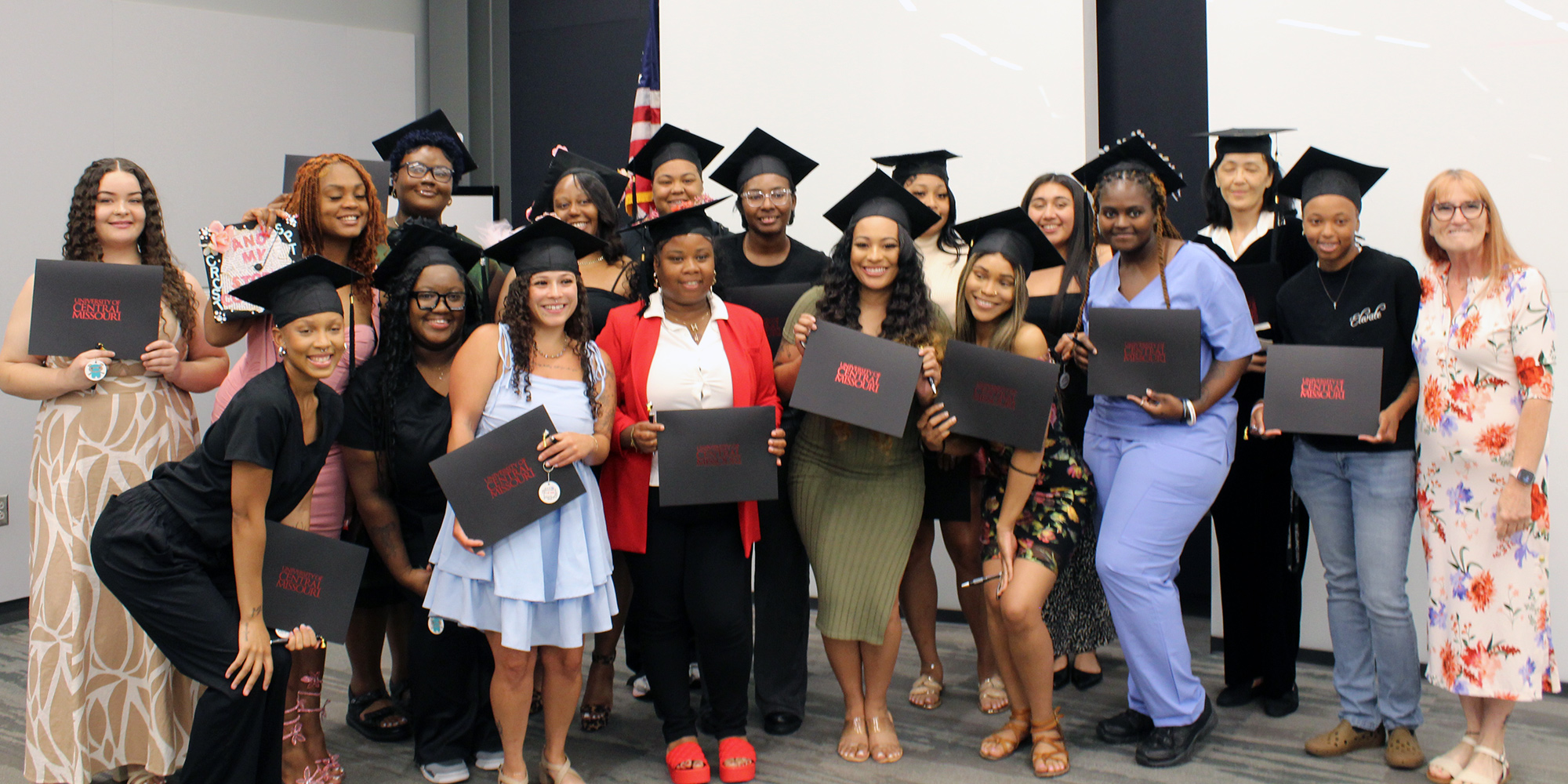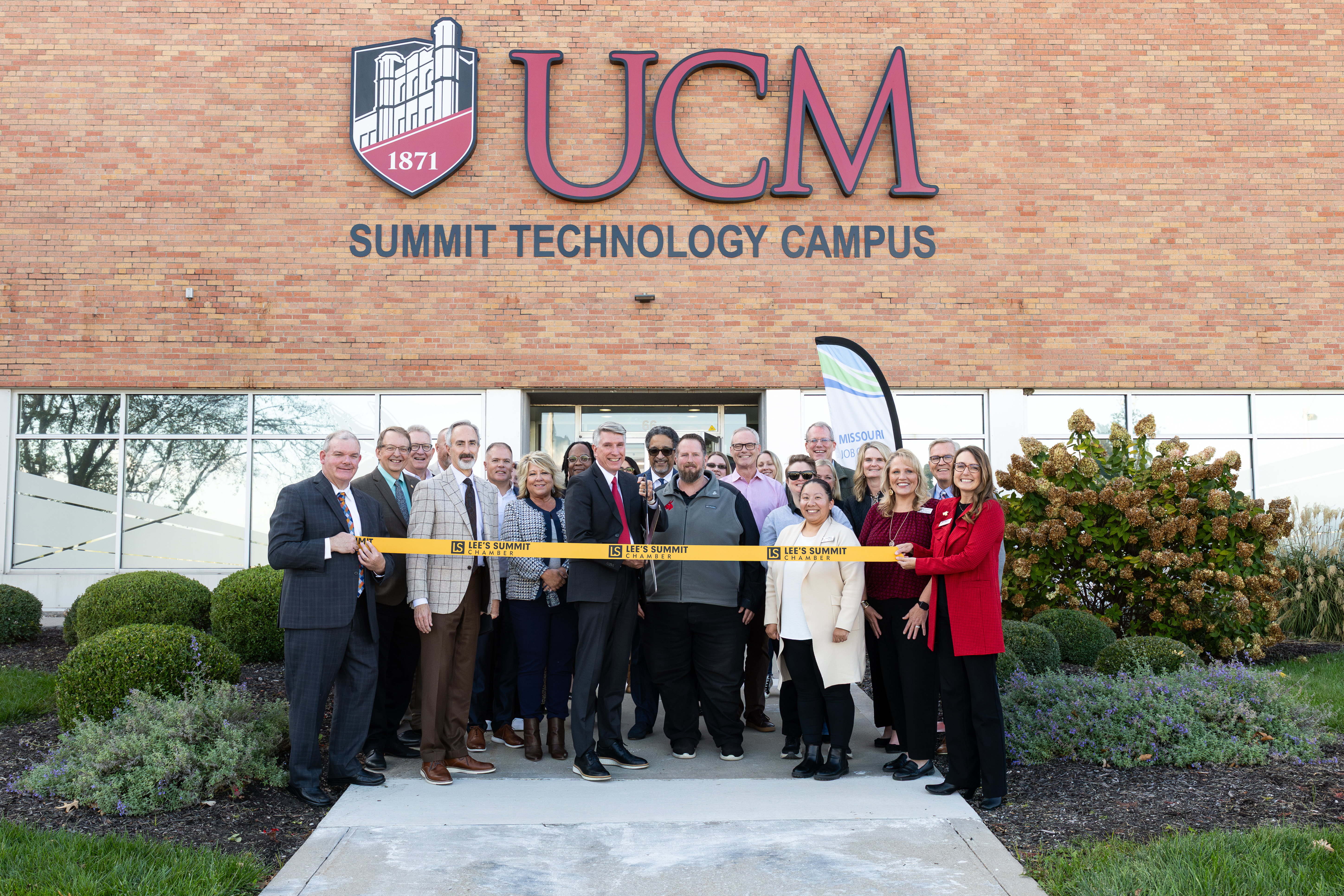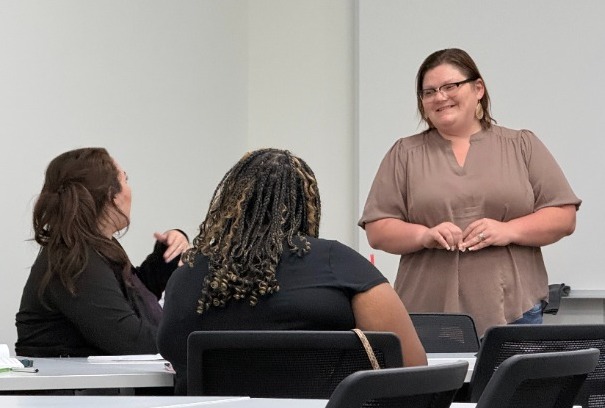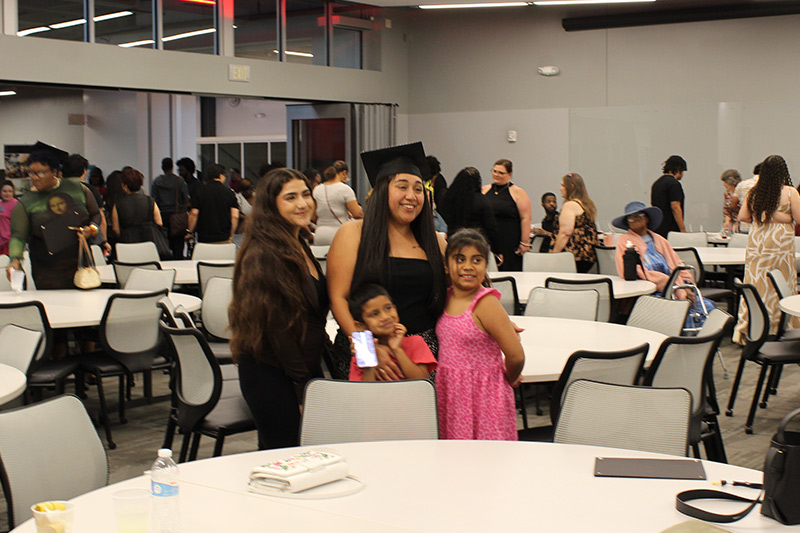Breadcrumb
A Bridge to Family-Sustaining Careers: Inside UCM's Center for Workforce and Professional Education
By Alex Greenwood, November 21, 2025

On a recent evening at UCM Lee’s Summit at the Missouri Innovation Campus (MIC), a large room quickly filled with families, strollers and smartphone camera flashes. Four generations crowded together as new certificate earners crossed the front of the hall, some in home-decorated mortarboards and scrubs. There was laughter, tears, a couple of sheet cakes and unmistakable pride.
These ceremonies are the public face of the University of Central Missouri’s (UCM) Center for Workforce and Professional Education, where short-term, skills-focused training is helping Missourians step into better jobs faster. The Center's mission is straightforward: serve people who do not have the time, resources or interest to pursue a four-year degree by preparing them for family-sustaining careers — in weeks and months, not years.
The delivery model is equally pragmatic. Students can choose online, hybrid or face-to-face formats depending on their work schedules, childcare constraints and learning preferences. Programs range from healthcare certificates to customized corporate training, all designed to match the pace and demands of adult learners already balancing jobs and families.
"We start by instilling hope," Program Manager Scott Boyce said. "Many of our learners have never had a positive academic experience. We meet them where they are, build confidence, then layer in technical skills tied to real jobs."
CoreBuilders: Soft skills that are hard to find
Boyce added that each program begins with CoreBuilders, a homegrown curriculum developed in 2009 with input from Kansas City employers and the Full Employment Council. Designed to fill the soft-skills gap identified by hiring managers, CoreBuilders covers self-leadership, integrity, communication, teamwork, problem-solving and goal setting. Career management modules and a DiSC workshop that breaks down personality types and work styles round out the online component.
"When we started hearing from Kansas City employers through the Full Employment Council back in 2009, the message was consistent: technical skills alone weren't enough," said Laurel Hogue, Ed.D., vice provost for Online and Learning Engagement. "They needed people who could show up ready to work with others, solve problems on the fly and take ownership of their role. We couldn't find a soft-skills curriculum that matched what Missouri employers were actually asking for, so we built one ourselves. That investment reflects what UCM believes about workforce education; it has to be responsive, not theoretical."
What's in demand now
Healthcare pathways lead current enrollment. Alongside the Certified Nursing Assistant program, UCM's revamped Clinical Medical Assistant PLUS stacks preparation for national CMA, phlebotomy and EKG credentials. The new Pharmacy Technician program launched on Aug. 5, with Walgreens offering clinical spots to the inaugural class, plus employment opportunities for strong performers.
Missouri's occupational projections tell the story in numbers. According to state occupational data, pharmacy technician roles are expected to grow 13 percent statewide, from roughly 9,700 jobs to more than 11,000. Medical assistant positions, paying around $40,500 annually for certificate-level work, show similar momentum. The Kansas City region alone projects healthcare and allied fields, claiming a substantial share of job openings.
In sterile processing, healthcare administration with medical billing, and hazmat removal technician training, the Center partners with industry to align instruction with open roles. Upcoming pre-apprenticeship pilots in electrical, plumbing and HVAC will integrate virtual reality to shrink lab footprints and attract younger learners.
"The Summit Technology Campus (STC) in Lee's Summit puts us right in the middle of a major labor market, adjacent to state workforce offices, and physically close to the employers who are hiring our graduates," said Clarinda Dir, program manager for Workforce and Professional Education. "For noncredit programs, speed matters in ways it doesn't for traditional degrees. When pharmacy techs are in short supply or sterile processing roles are going unfilled, we can't spend two years working through curriculum committees. We need to move at the speed of the economy, and that's what the Center is built to do."
The new hub for workforce education
That economy-speed mindset took center stage at the recent ribbon-cutting for the Summit Technology Campus, UCM’s newest location in Lee’s Summit. President Roger Best called the site “our hub for workforce development and professional education,” noting that UCM’s footprint in Lee’s Summit now exceeds 100,000 square feet across two campuses.

In the first year of operation, UCM Lee’s Summit offered two graduate degree programs and served almost 300 students. This fall, UCM Lee’s Summit is serving more than 2,000 students in 11 graduate degree programs, 11 undergraduate completion programs and 10 standing workforce development and professional education programs.
“For us, being able to stand here and create this as our hub for workforce development and professional education is very vital,” President Best said. “Even though this is our hub for the 10 programs we already offer, we will be expanding into more programs. This space will be fully utilized.”
The facility houses noncredit and certificate programs aligned with regional workforce needs while also co-locating satellite offices for the Missouri Job Center and Full Employment Council to streamline access to training, job placement and support services.
State and community partners
Ben Boggs, Ph.D., commissioner of the Missouri Department of Higher Education and Workforce Development, praised the partnership as a model of what the state hopes to replicate elsewhere.
“Our colleges and universities are not just places for academic excellence, they’re economic engines and community anchors,” Boggs said. “When we partner with our public workforce system, we align programs with industry needs, create flexible pathways and serve all Missourians.”
Boggs noted that the collaboration helps Missouri progress toward its goal of 60 percent of working-age adults holding a postsecondary credential by 2030. He said the STC’s integration of education, workforce and employer partnerships is “breaking down silos” and making the path from learning to earning clearer for students.
Clyde McQueen, president of the Full Employment Council, described the new facility as “an example of what people need,” calling UCM “a creative and innovative entity” that has collaborated with the council for more than two decades. “We’re very proud to be here,” McQueen said, “and appreciate the willingness to work with us when we face the most difficult possibilities.”
Local business leaders share that view. Matt Baird, president of the Lee’s Summit Chamber of Commerce, said the new campus demonstrates how UCM and the city continue to grow together. “We love to see this type of turnout for one of our awesome community partners in the University of Central Missouri,” Baird said. “It’s amazing to see just how much it’s expanded.”
Instructors from industry
All instructors come directly from the fields they teach, serving as adjuncts who bring current practice, mentorship and employer ties into the classroom. That approach pays off in readiness and hiring connections.
Jaklynn Hunt didn’t set out to teach medical billing and coding. She was an EMT paramedic until her daughter's health diagnosis pulled her off the ambulance. "I had started falling in love with the coding process," Hunt said, describing how paramedics pre-code their own calls. She found a mentor, kept learning and worked her way through the entire revenue cycle "because I'm nosy by nature. I want to know what happens to it after I touch it."
A decade ago, she met Boyce while contracted to teach at the MIC. At the time, she was battling stage-four cancer across multiple organs. Later came a bout with non-Hodgkin's lymphoma. Through both rounds, she never missed a class.
Fast forward to January 2025, and Hunt finished dual degrees — bachelor's and master's in Health Information Administration — while raising five kids and launching her own consulting firm. She now holds 22 multi-specialty coding certifications and consults on Medicare fraud cases for the FBI.

Instructor Jaklynn Hunt.
"I’d never give up teaching," she said. "My students see me juggling everything they're juggling, and then some. When they want to quit, we talk about short-term sacrifice for long-term goals. If you don't finish, you didn't try. If you don't fail, you'll never succeed."
That mindset extends to Hunt’s classroom approach. She teaches to four learning styles at once, circling back until every student finds their entry point. Her students don't just learn to code claims; they learn that obstacles aren't endpoints.
"A lot of them have this idea from TV commercials that coding is easy money from home. It's not,” she said. “But if you put in the work, you can do anything with this, anywhere from private practice to the FBI. I need more people like me in this world who want to teach what they know, and lessen what they don’t!"
Lowering the intimidation barrier
Before the pandemic, most cohorts met in community spaces to reduce the intimidation some first-time or returning learners feel on a university campus. Today, about 80 to 90 percent of cohorts meet at the MIC or STC, and the Center continues to make access a priority with scholarships funded by partners like the Full Employment Council, Community Services League and Great Jobs KC.
"The scholarships and wraparound support from the Full Employment Council, Community Services League and Great Jobs KC aren't add-ons; they're the infrastructure that makes these programs work for people who've been locked out of opportunity," Boyce said. "Case managers walk students from enrollment through job placement. Co-locating state workforce staff at the STC means someone can check on childcare assistance, transportation vouchers or SNAP benefits in the same building where they're learning phlebotomy. That's not accidental. That's intentional design."
Women make up roughly three-quarters of recent cohorts, a signal that career-ladder roles in healthcare and allied fields continue to attract working mothers, caregivers and career changers.
Built for speed in a changing economy
The catalog is intentionally fluid. As technology and hiring needs shift, certificate offerings shift with them. That flexibility, Boyce notes, is harder to achieve within traditional degree structures, which are bound by longer approval cycles.
"We don't want to train people for the sake of training," he said. "If entry-level programming jobs are tightening due to AI, we pivot. If sterile processing or pharmacy techs are hiring, we scale. The goal is outcomes."
He frames the Center as a bridge. For learners intimidated by debt or unsure about a degree, short-term certificates provide a faster, lower-risk on-ramp to a stable income. For employers, they deliver candidates who are ready on day one.
New beginnings
At graduation, the rapport among students, instructors and staff is obvious. Microphones are passed, thanks are shared, stories spill out: the first person in a family to earn a credential, a single parent landing a job with benefits, a military veteran stepping into a civilian career.
Hunt watches from the side of the room. Her students know much of her story by now, in pieces. They know she doesn't accept excuses because she's lived past every good reason to quit.
"I need more people like me in this world," she says, not as ego but as a recruiting philosophy.
Pride radiates through the rows, where children take a break from a piece of cake to hug their moms and dads, who beam with their new certificates. Parents, spouses and grandparents snap photos, laughter peals through the room, and the next cohort is already forming in the back, ready to take the stage.
For more information about certifications available at UCM’s Center for Workforce and Professional Education, visit ucmo.edu/workforce or call 660-543-6198.









